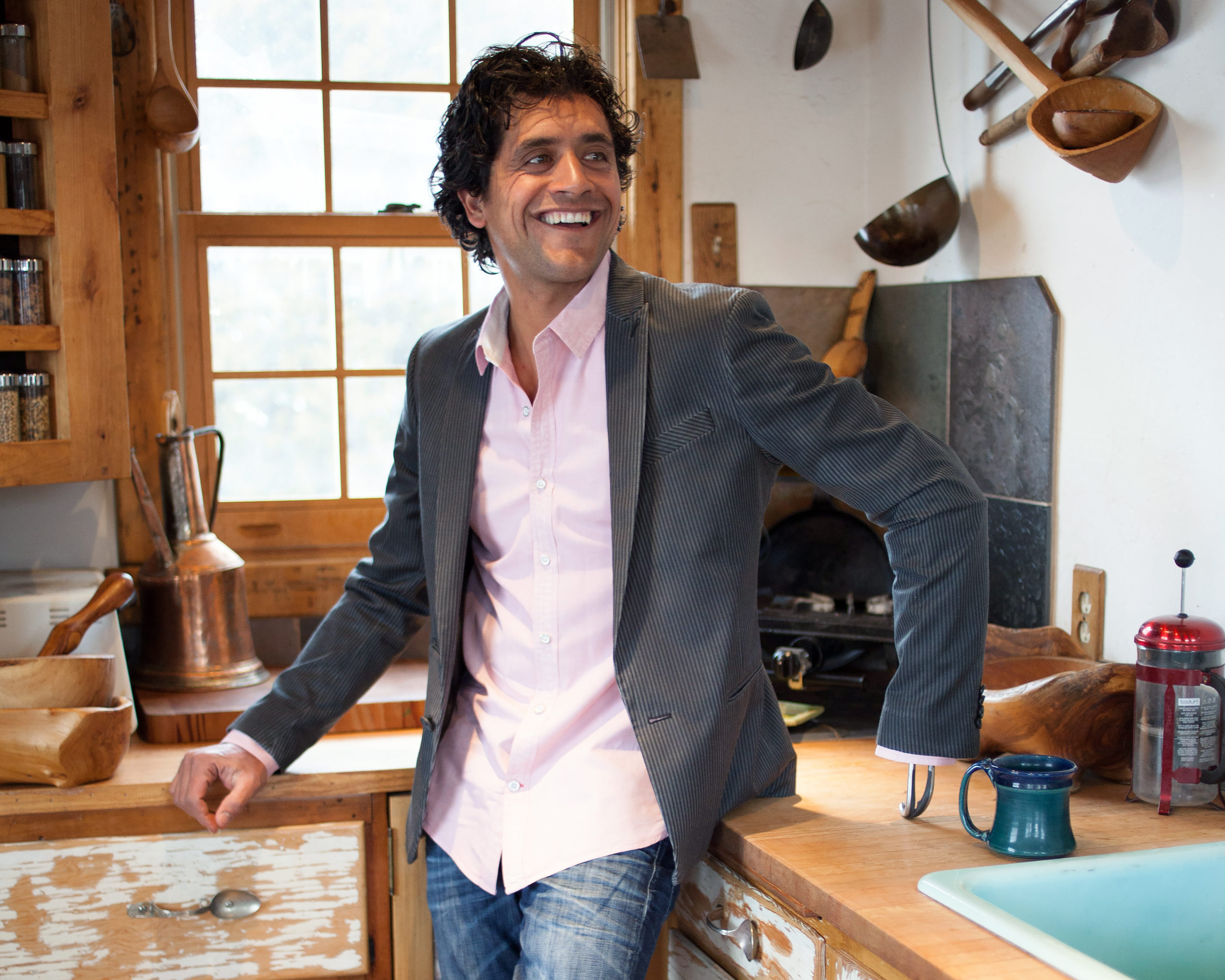
- Interview by Tammi Heneveld September 30, 2015
- Photo by Taylor Kent
Eduardo Garcia
- chef
- entrepreneur
Eduardo Garcia is a Montana-based chef who became well known for cooking with a prosthetic arm after surviving an electrocution accident in 2011. He is the cofounder of Montana Mex, a food company offering all-natural sauces and seasonings. The Kickstarter campaign to fund Charged, a documentary film about Eduardo’s experience, ends October 3, 2015.
Describe your path to what you’re doing now. I’m a twin, and my brother and I were born in LA County about a month and a half premature. My brother, Eugene, was lined up first in the womb until I did a backflip on him and blocked the way. My mom jokes that this was me letting everybody know that we were doing it my way, and when my mom had her C-section, I came out first.
My mother was a Spanish teacher, and I didn’t really know my dad until I was in my early teens—he moved back to Mexico when I was a couple weeks old. I was raised in a spiritual community in California. People ask me what religion we practiced, but it was sort of an amalgamation of many world religions and beliefs into one: we believed in Jesus, Buddha, reincarnation, and karma equally. When I was six, the community moved to the Corwin Springs area of Southwest Montana. The new property was immense, covering several square miles on the border of Yellowstone National Park. It wasn’t a commune, per se, but everything was communal. I recall gardening throughout the summer and joining the adults to milk the goats in the mornings before school.
I had endless amounts of energy and was all over the place as a kid. Because of that, I was often found to be disruptive and had a hard time in school. People were constantly yelling at me to stop crawling around and climbing on stuff. I didn’t want to sit and read books—I wanted to be given something I could touch and feel and tear apart. From preschool all the way up through high school, I was kicked out of nine schools for disruptive and rebellious behavior. I started using drugs, drinking, and abusing substances by 11 or 12 and ran with a self-regulating, Lord of the Flies-type group of boys and girls who all came from broken families. I spent my youth running free in the Montana hills, and everything seemed like a wide-open adventure.
Eventually, after being kicked out of every school in the district, I made the decision to attend military school in New Mexico for the first two years of high school. I learned some of my most formative life lessons there, but was unfortunately expelled after a year and a half. That was a pivotal time in my life. I home-schooled myself through the remaining portion of my sophomore year of high school and entered back into the public school system as a junior. Ultimately, I graduated with good grades and a good reputation in the spring of 1999.
Was there an “Aha!” moment when you realized that cooking was what you wanted to pursue? I remember making french fries with my friends when I was about 11 years old. Our single, working parents were busy most of the time, so during the summers we would often have to fend for ourselves. I was hungry and put two and two together that potatoes plus hot oil equals a french fry, so I decided to make some for my friends. I took some oil, put it in a pan, and cut some fries. The oil was not hot enough, so the fries were soggy and totally grease-laden, (laughing) but we ate them. That was the first moment of revelation for me when it came to understanding how food is made. I recognized that cooking equals eating, so if I wanted to eat, I should learn how to cook. It was that simple.
I first started cooking professionally simply because I needed a job. When I was 15, I started working as a prep cook at a local bar and grill called Chico Hot Springs. I didn’t even know what prep cooking was, but it ended up being a completely eye-opening experience. After being in the kitchen for an hour, the chef asked me, “Do you want to learn how to make a pizza?” I thought, “Of course!” I realized that I’d spent my whole life eating, but I hadn’t ever thought about eating as a process that went from something being grown to being sourced, prepared, and then eaten. Food is a rich story; it’s not just what we eat. Before that, my relationship to food hadn’t ever gone beyond asking, “What’s for breakfast?” Or, “What’s for dinner?” Once I started cooking, I thought, “Wow, there’s salty, sour, sweet, tart, bitter, spicy—this is cool!” Not only was cooking giving me a paycheck, but it was fun and totally liberating.
That sense of freedom and creativity stayed with me, and I started working at an Italian restaurant as a 17-year-old senior in high school. Robert Meadows, the chef at the time and a good friend to this day, asked me if I wanted to run the lunch menu that summer. I said yes, even though I was the only guy in the kitchen and had only been cooking dinner up to that point. I didn’t even consider that there was a challenge involved with running a menu—I just decided to go for it. I remember going to the town library and looking through the cooking forums in old copies of Reader’s Digest. They’d have three recipes a month, and I’d see something like chipotle grilled chicken breasts with cherries and think, “Ooh, that sounds good.” I didn’t really know what I was doing: I would literally take a recipe that served six people, tweak it to my liking, and multiply the quantities to however many customers we thought we would serve that day. I was just cowboying, as they say.
At 17, I still had a bit of a rebellious streak and had been drinking and using drugs for a few years at that point. Thankfully, I got into fly fishing that summer, which kept me out of trouble—I was either in the kitchen or on the river. On New Year’s Day of that year, I made a conscious decision to quit any substances of any kind: coffee, booze, pot—everything.
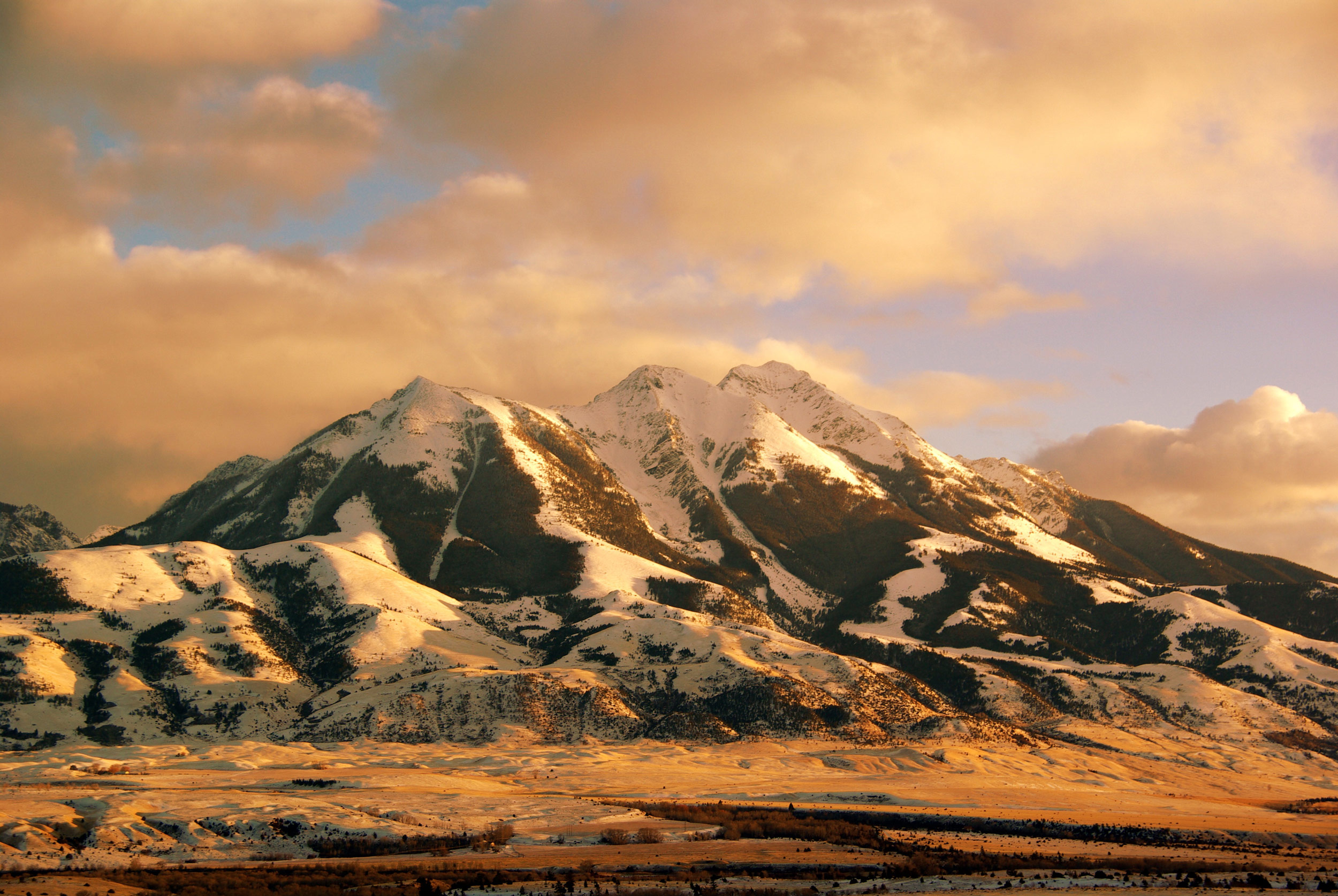
“I realized that I’d spent my whole life eating, but I hadn’t ever thought about eating as a process that went from something being grown to being sourced, prepared, and then eaten. Food is a rich story; it’s not just what we eat.”
You just went cold turkey? Yup. I remember smoking a joint with my brother at a New Year’s Eve party and saying, “This is the last joint I’m going to have for a long time,” and handing it back to him. I was done.
Did becoming more serious about cooking cause you to do that? Yeah, cooking had started to inspire me and make me feel high in other ways. I wanted to experience a consistent, healthy lift, and cooking was a way to do that.
After graduating high school, I decided to attend culinary school at the Art Institute of Seattle. That was the beginning of the next 16 years of my life. It was a crazy time: I was getting two hours of sleep a night in between three jobs, school, and my then-girlfriend. Classes started at 6:30am, and most days I would sleep through the first hour of lectures. But once cooking started, I would spring into action, hammer through my work, and sometimes find room to make a big sauté of eggs for a group breakfast. I remember often sleeping with my watch on my ear so the alarm was sure to wake me up, hopping on the bus, accidentally sleeping through my stop, then ending up somewhere in Chinatown and having to find my way back to my regular route somehow. To make some extra money on the side, I would iron my classmates’ chef jackets for a couple bucks a piece, and I even did some nude modeling for a bronze sculptor for a couple years. I had all of my stuff stolen at one point, and had nothing at many different times. I picked veggies out of garbage bins at Pike Place Market and used bolted garlic and other ingredients that were still great but had been thrown out because they didn’t look perfect. During that time, I became very impassioned by cooking and began to feel a great amount of enthusiasm for feeding others.
The culinary program was 21 months long. I knew my student loans were going to kick in nine months after graduation—which would triple my bills overnight—so I was going to have to figure some shit out pretty quickly in order to support myself. I had been given a terrific opportunity to cook and roll sushi at a Japanese restaurant called Saito’s, but the idea of sticking with the restaurant industry was unsettling to me, and I had no idea what I was going to do. A month before graduation, one of the instructors, Chef Robert Wood, said, “Eduardo, I’ve got a job you can’t refuse.” He said there was a yacht at the marina in town called Dorothea that had just fired their chef for being drunk on the job—he had been chugging mouthwash.
Eww. Gross, right? (laughing) So they needed a chef. After checking it out and talking to the captain, Mark Drewelow, for one of the first times in my life I said no. I had just started at Saito’s, and it was a great opportunity, so I decided to stick with it. Six months later, Captain Drewelow called me back. He said, “Remember me? We need a chef again, and the job’s yours if you want it. You have a week to let me know.” I thought, “I can’t pass this up twice,” so I took the job.
I spent the next 11 years working as a chef in the yachting industry and traveled to dozens of countries while working consistently on a handful of full-time and part-time yachts. Anytime I woke up in a new town somewhere, I’d grab my skateboard and go explore. I’d find the local baker and the halal butcher and the sheepherder, or seek out the Tunisian chef who made the perfect spice rub. I just opened myself up to the world.
I spent the better part of a decade seeing the globe, eventually meeting my girlfriend, Jenn, along the way in 2006. Four years later, I realized I was losing my passion for working in the yachting industry, and in losing that passion, I was struggling to keep up with the accompanying 20-hour work days for months on end.
Working that much would burn anybody out, no matter what you do. Yeah, I was toast. I ended up leaving the yachting industry in March of 2011 to come home to Montana and put more time into running a retail food company, Montana Mex, which I started in 2010 with Jenn and my older sister and brother. During that time, Jenn and I also began co-writing a television concept called Active Ingredient, an outdoor cooking show that takes my gourmet appreciation for food and combines it with my love affair with the outdoors. We received incredible interest from talent agencies and networks, and Montana Mex was growing quickly. My life was red-hot.
Everything changed on October 9, 2011. I was out bowhunting in the woods by myself when I stopped to investigate the body of a bear I found. After reaching out to touch it with my knife, I was electrocuted by 2400 volts of a buried, unmarked power source and was immediately knocked unconscious. When I came to, luckily my eyes opened and my heart was still beating. After somehow getting on my feet, I hiked for three miles before I found help. Within two hours, I was put onto a Medjet and air-lifted to the University of Utah Health Care Burn Center in Salt Lake City.
I spent 48 days in burn trauma, and underwent 21 surgeries over the course of 19 months. The doctors had to amputate my left hand and part of my arm; and they had to remove a section of four ribs along with major muscles from my abdomen, chest, and legs. In the middle of all of this, the doctors then told me that I had testicular cancer! I was in total shock, and without having a choice in the matter, I immediately wrapped up my burn recovery and shifted into an intensive, three-month regimen of chemotherapy.
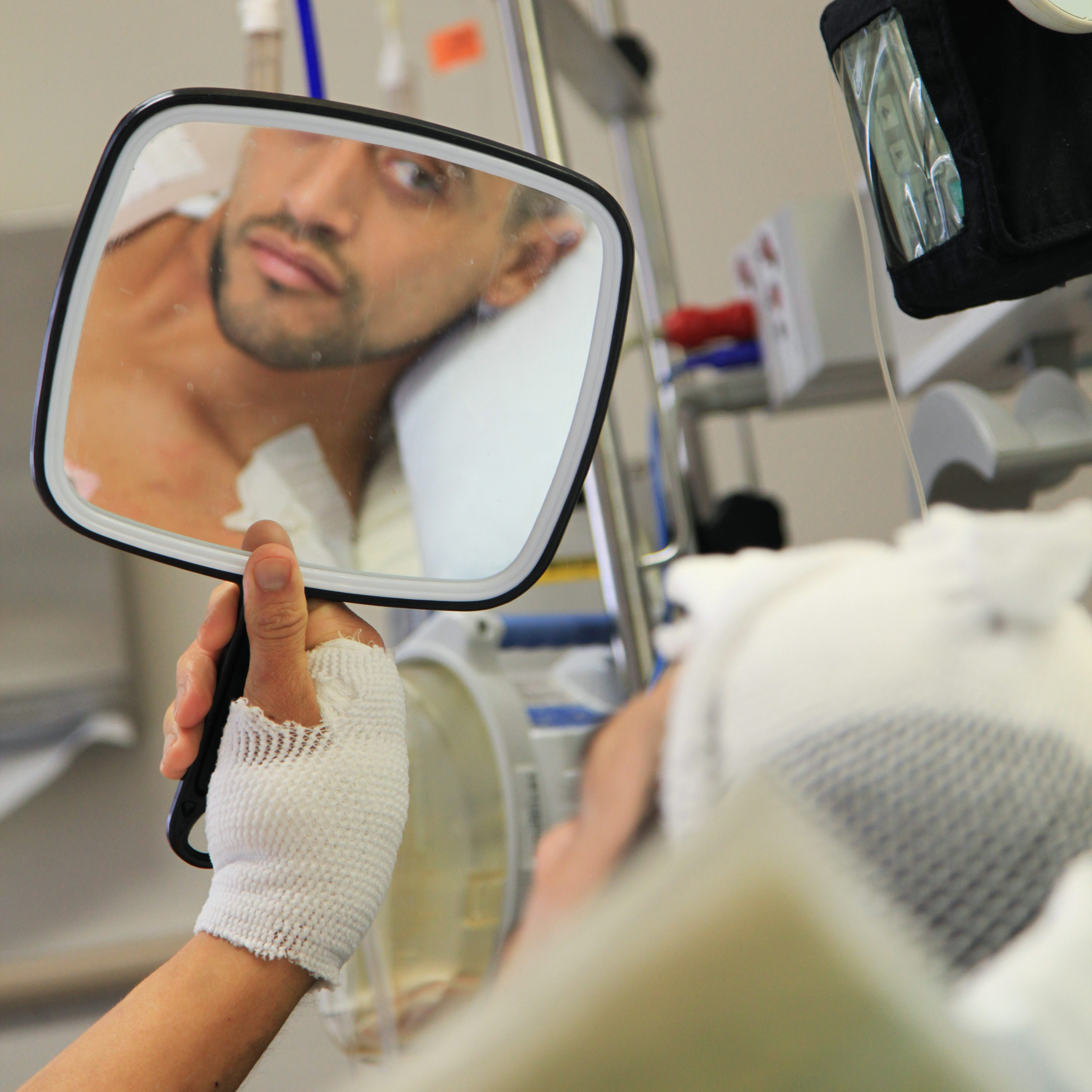
“Everything changed on October 9, 2011. I was out bowhunting in the woods by myself when I stopped to investigate the body of a bear I found. After reaching out to touch it with my knife, I was electrocuted by 2400 volts of a buried, unmarked power source and was immediately knocked unconscious.”
Oh my god. What was recovery like? My physical recovery was the quickest: the second they let me walk, I walked; the second they let me go to physical therapy, I was in there. I was released from the hospital a few days before Thanksgiving, and I started cooking again as soon as I got my prosthetic arm. We were staying with friends and family at the time, and I said, “I have to cook you guys a meal.” I was focused on learning how to use my new arm. I thought, “Oh, cool: if I move it like this, then I can hold something.”
In the beginning, I kept dropping things and fumbling with everything. I said to myself, “Alright, you’re not going to be the speedy kid who was so enchanted with the hustle of the kitchen life anymore.” It was a reality check for me. I couldn’t be the one who hustles 100 pounds of tomatoes and dices them all by himself anymore, or be the one who physically folds all the croissants—someone else has to do that now. However, I can take the love affair I have for feeding others and step into more of a supportive and commanding role.
Cooking is as soulful and cerebral as much as anything else: the body must follow. The passion is all inside of you, and your body keeps up with your inner flow. A humility check came into play after my accident, and I have so much gratitude for being able to still do what I love. Thankfully, I’m more of a loose, liberal kind of chef now. A dish doesn’t need to be perfect. Instead, let’s make it imperfect and focus on why we’re making it: to feed the people we love and appreciate, and feed them well.
How did your food brand, Montana Mex, come about? In 1993, my dad moved back in with my family in Montana. With his return to our lives, food and mealtimes began to take more of a center stage, and my friends clamored over the wonderful food being served at our place. Montana Mex started as a result of my Dad doing very casual catering for friends and family. He would make Mexican foods like taquitos, tacos, empanadas, tamales, and salsa for people around Montana. I think my Mom coined the name “Montana Mex,” and my brother made him a business card for it.
When I got older, whenever I made salsa at home, my friends would tell me, “Oh my god, you have to bottle this and sell it.” Oftentimes, my brother and I would get all fired up and start talking about starting a food company, but we wouldn’t ever do anything about it. Jenn finally became fed up and cornered us in the library one day and said, “Alright guys, stop talking about it and actually do it. If you start a business, I’ll be a part of it.” So we did.
We started talking about the business in 2009, and it became an LLC in early 2010. My brother handled the business end of it, my sister did the organizing, Jenn was the creative, and I was the chef. We began by selling our salsa at local farmers markets, but had no idea what we were doing. The recipe I created was very labor-intensive: every ingredient was roasted, toasted, reduced, etc., because I was going for maximum flavor. While I think we achieved that, the labor and cost involved was just through the roof, so we weren’t making a dime. We went way in over our heads and quickly realized that that was not how to run a successful business.
In early 2011, we took a hard look at what we were doing and began to rewrite our business plan and strategy—Jenn actually rewrote it from a recliner in the ICU during my recovery. We decided to focus on a national product from which, when we scaled the numbers, we could actually make a profit once we crossed a certain threshold of scale. We also shifted from making a perishable product to a non-perishable line of products, like seasoning blends and table sauces, and we’re currently about to launch an extra virgin, non-GMO avocado oil. We now sell our products through e-commerce, and people can find our products across the country in stores like Albertson’s, HEB, Kings, Balducci’s, and Stop-n-Shop.
Do you feel a responsibility to contribute to something bigger than yourself? Yes. I’ve always been someone who believes in contributing to the community around me, but that took on greater meaning when we decided to make Charged, a documentary film about my experience that we’re currently looking to fund through Kickstarter.
Were you planning on making the film as soon as the accident happened, or was it an afterthought? We had already been filming our cooking show, Active Ingredient, since 2010, so we had a fair amount of content already gathered. When I was electrocuted, my good friend and director of Charged, Phil Baribeau—along with Denver-based production company, Citizen Pictures—made sure that all the camera gear was sent to the hospital and that Jen knew how to use it. Everyone’s opinion was that we should film what was happening, so Jenn rolled camera for the 48 days I spent in ICU and all throughout chemotherapy. When I came home from the hospital, Phil called me and offered his time and services. He said, “Hey man, we’ve got to get you hiking and fishing again. As you go through these steps to rebuild your life and find yourself, you need to continue to document it. I don’t know why yet, but you have to.” So we continued shooting, and we now have an incredible library of footage.
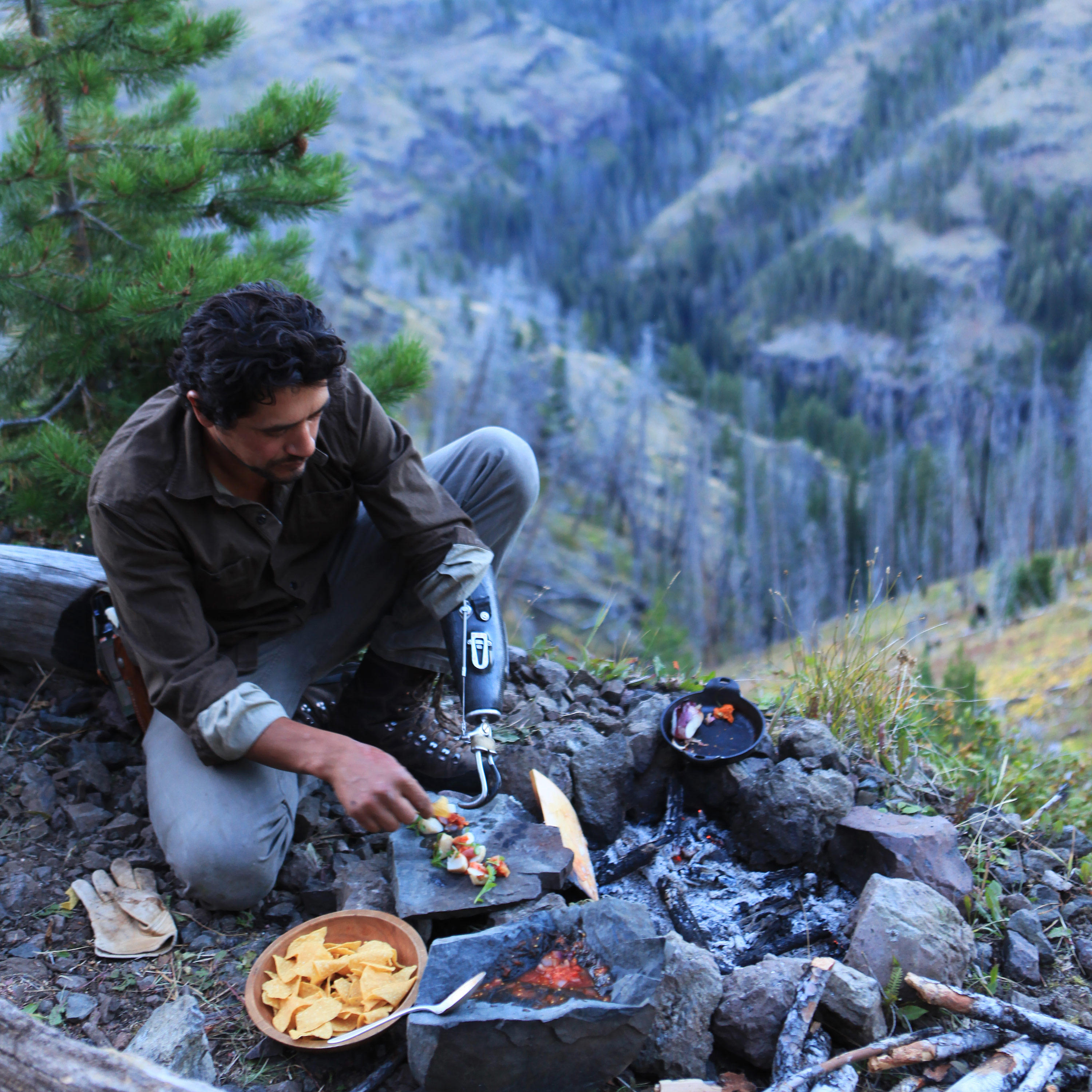
“The person I want to be today is a direct result of waking up every morning and telling myself to regret nothing and forgive everything. I need to learn from my mistakes and approach every day with the correct mix of humility and ego…”
At first, I wasn’t convinced that making a documentary film was a good idea. Jenn and I were sitting on 10 terabytes of footage and 4 years of professionally shot film, but I was very much against doing anything with it—I was content to just be recovering at home and running my business. But in early 2014, I realized that it might be selfish to not share my story. Last January, I went to visit Dr. William Morris and some of the nurses who were on call when I rolled in to Salt Lake City the day of my accident. He said, “You need to come around more often. It’s so good to see you like this now.” When a patient comes in, the doctors and nurses save the patient, they watch the patient for x amount of time, and then the patient leaves and goes on with his or her life. When I first came in, the doctors described me as a bag of bones with a heartbeat. When I saw Dr. Morris, I realized that I’m not the only one who got hurt: everybody around me also went through trauma and pain when I had my accident. Sharing my story has been one of the most healing methods of processing what happened. Having my family, friends, and doctors hear me say, “I’m okay with what happened and who I am today, and I’m moving through this,” gives them the opportunity to process and move through it, too.
There is a certain amount of good that telling my story can contribute to the world, but that means I have to open up. It means sharing my personal life, where I’ve failed, where I’ve done people wrong, and where I’ve lied, cheated, and stolen. Yeah, I was a rebellious kid; I was a shithead. To put all of that out there so transparently in a documentary film—not to mention putting in the man hours required to actually make it—is a huge risk. People who only know me through the media might say, “This guy’s amazing! What an inspiration!” But they don’t know my failures. They don’t know that I’ve made mistakes that have hurt people. By telling my story, it creates the impetus for me to be a better person every day. The person I want to be today is a direct result of waking up every morning and telling myself to regret nothing and forgive everything. I need to learn from my mistakes and approach every day with the correct mix of humility and ego so that I can succeed in what I’m meant to do.
Beyond the film, I’m also a sponsored athlete and fundraiser for a group called the Challenged Athletes Foundation (CAF), whose mission is to raise funds to bring adaptive sports medicine to physically challenged individuals. They help fund athletes who want to compete in the Paralympics and folks like me who do a few triathlons or marathons throughout the year. The son in a family of CAF supporters had been championing my case tirelessly until I received a phone call one day with an invitation to attend one of the organization’s summer events in New York City. Shortly after that, I put on a CAF jersey and competed in my first triathlon. I ended up raising $10,000 for their organization, but when I sent them the check, they mailed it right back to me and wrote, “Put this towards your first adaptive piece of sports medicine instead.” They’ve inspired me, and my life is immensely richer now because of their organization.
I also occasionally do speaking gigs and lectures. I recently flew out to California to chef at the Do Lectures this year after cheffing it last year and giving a talk there in 2013.
What advice would you give to a young person just starting out? Be inspired by the world around you and open every door. Our world is made up of connections, and you never know what saying yes will lead to. For example, if you want to get into graphic design and someone offers you an opportunity to prune trees for $5 an hour, do it: that experience may end up inspiring an award-winning design that you make for that arborist 10 years down the line. You never know.
More importantly, though, remember to ask for help and take care of you. You can sacrifice a lot in life, but you should never sacrifice yourself. You are the vehicle and the tool to your success. If you neglect your own needs, then you’re going to be in a far weaker place to give or contribute to others. Spend the time to give yourself some love. When you’re as solid and strong as you can be, then you’re in the best place to give to others, whether it’s lending a helping hand, saying a kind word, or giving someone a couple bucks when they’re down.
Another piece of advice I’d give is to not let fear stifle you, even for a second. Fear is an incredible thing, and it is the single most contributing factor to my life. Fear is necessary—it rattles your cage—but let it rattle your engine too, in the right way, towards something progressive. Let fear motivate you beyond all means.
How does living in Montana influence the work you do, and is it important to you to be part of a creative community? I have one of the strongest communities on earth here. I have neighbors who will let me borrow their backhoe so I can dig a huge garden, and I have friends who will help me drag an elk out of the woods at 2am so I can then create an epic woods-to-table meal. I recently ran into a friend who donated to our Kickstarter campaign the other day. He runs a production company here and said, “Hey, we have lenses and whatever extra camera equipment you need. Don’t be afraid to call us.” I couldn’t imagine myself living anywhere else.
I do love to travel, though, and I love visiting big cities. It’s such a great opportunity to eat a more diverse range of foods. Recently, Governor Schweitzer gave the commencement speech at my brother’s college graduation ceremony and told the graduates, “I want every one of you to leave Montana.” Everyone looked confused, but then he said, “I want you to explore, understand, discover, and be enriched by the world, and then I want you to bring your experiences and inspiration home to Montana.” That’s how I feel. I become inspired by crushed bottle caps in the hot asphalt roads of Antigua, sheep herders in the Southern French Alps, Chinatown in New York, and LAX at sunset. Those experiences and opportunities become a part of my palate. When I come home, I start dissecting what spoke to me and how I can share it with my community here in Montana.
What do you want to explore or work on in the next few years that you’re not already doing? Honestly, I’m pretty tapped for big projects right now. We’re hoping to wrap our documentary film and put it in the can in late 2016. Montana Mex is on the verge of a tipping point of becoming a nationally recognized brand within the next two years. And we’re hoping to sell our TV show, Active Ingredient, next year sometime.
Beyond that, I’m looking forward to spending more time at home and having more family dinners in my yard with food from my garden, sitting next to the people I love.
What kind of legacy do you hope to leave? I would like to be remembered for being someone who had a cup-half-full mentality—someone who wasn’t afraid to admit his faults, but who didn’t let those faults hold him back. I can be a little bit of a bull in a china shop sometimes, but someone has to shake things up. I also love working with people, and nothing is more rewarding to me than helping others succeed. I’m at a place in my life where I want to win big so that I can help tee up countless others to realize their own potential.
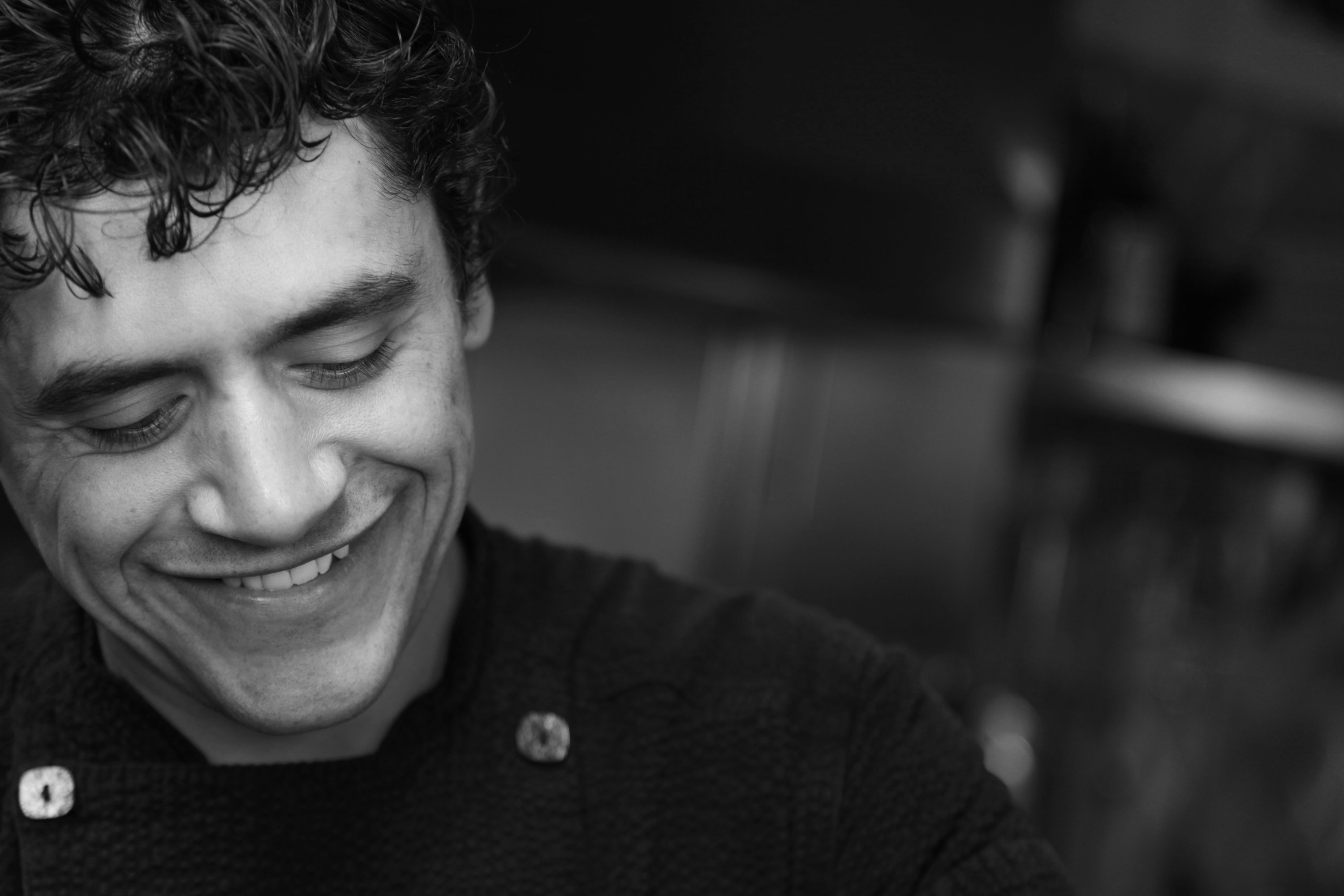
“Sharing my story has been one of the most healing methods of processing what happened. Having my family, friends, and doctors hear me say, ‘I’m okay with what happened and who I am today, and I’m moving through this,’ gives them the opportunity to process and move through it, too.”